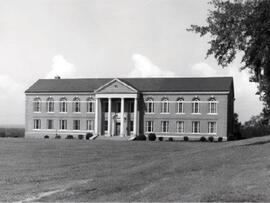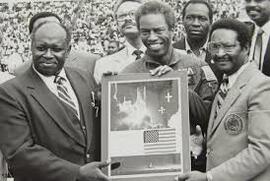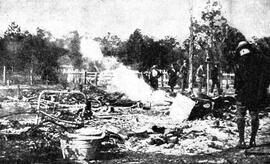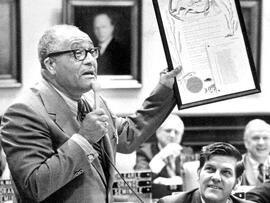George Whitefield Conoly, (born 1902, died 1980) was instrumental in developing the Florida A&M University National Alumni Association and served Florida A&M University for almost 36 years as executive secretary and director of FAMU Alumni Affairs. He founded the FAMU Alumni Association in 1925 as an unfunded personal project. He spent his free time traveling across the U.S. to meet with alums and build deeper comradery; deeper social, professional, and financial commitment to FAMU; and continued participation in University affairs.
This collection contains alumni chapter meeting records, financial records, photographs, and correspondences from the years George Conoly was most active in build the Florida A&M University alumni network, along with some of the personal effects of George and Eunice Conoly.
Every university has a history, but few have a history as unique and impressive as ours. For more than 130 years, Florida A&M University has served the citizens of the State of Florida and the nation by providing preeminent educational programs...programs that were the building blocks of a legacy of academic excellence with caring. FAMU, “Florida’s Opportunity University,” is committed to meeting the challenges and needs of future generations.
In 1884, Thomas Van Renssaler Gibbs, a Duval County educator, was elected to the Florida legislature. Although his political career ended abruptly because of the resurgence of segregation, Representative Gibbs successfully orchestrated the passage of House Bill 133 in 1884. This bill established a white normal school in Gainesville and a school for African Americans in Jacksonville. The bill passed, creating both institutions; however, the state decided to relocate the school for African Americans to Tallahassee.
After the bill’s passage, FAMU was founded on October 3, 1887. It began classes with 15 students and two (2) instructors. Thomas DeSaille Tucker (1887-1901), an attorney from Pensacola, was chosen as the first president. Former State Representative Gibbs joined Mr. Tucker as the second faculty member.
In 1891, the College received $7,500 under the Second Morrill Act for agricultural and mechanical arts education. The State Normal College for Colored Students became Florida’s land grant institution for African Americans, and its name was changed to the State Normal and Industrial College for Colored Students.
In 1905, the management of the College was transferred from the Board of Education to the Board of Control. This significant event officially designated the College as an institution of higher education.
In 1909 the name was changed from The State Normal College for Colored Students to Florida Agricultural and Mechanical College for Negroes (FAMC). The following year, with an enrollment of 317 students, the college awarded its first degrees.
President Nathan B. Young (1901-1923) directed the growth of the College to a four-year degree-granting institution, despite limited resources, offering the Bachelor of Science degree in education, science, home economics, agriculture, and mechanical arts.
Under the administration of John Robert Edward Lee Sr. (1924-1944), the College acquired much of the physical and academic image it has today. More faculty were hired, courses were upgraded, and accreditation was received from several state agencies. By the end of Lee’s term, FAMC had 812 students and 122 staff members.
In 1949, under William H. Gray Jr. (1944-1949), expansion and reorganization continued. The College obtained an Army ROTC unit, and student enrollment grew to more than 2,000.
This collection covers the funding, building and administration of the FAMC/FAMU Hospital.
In 1975, James N. Eaton spearheaded the effort that ultimately gave rise to the creation of FAMU’s Black Archives. By 1976, the ‘Black Archives Research Center and Museum’ came into existence, and Eaton was recognized and appointed as its inaugural archivist, curator, and director.
For the next three decades, he helped amass a collection of memorabilia and printed records that now comprise one of the region’s most extensive collections of first-source material relating to the history, culture and contributions of people of African descent living in the United States.
James Eaton constructed in 1976 the first exhibits, using historical memorabilia from his own family. Afterward, he petitioned the university and community members to contribute historical material to the repository. Ilis call was answered by the first Black Archives donors and volunteers, who included: Donald Hill, Frank Pinder, John F. Matheus, and a host of other individuals and groups. Thus, the Research Center was chartered in 1976 and was officially opened in 1977.
Promotional photographs, correspondences, news articles, publications, programs, miscellaneous
The material of this collection is comprised of both archival records and museum memorabilia relating to the life and death of Jazz legend Julian "Cannonball" Adderley. The material in this collection includes awards, books, correspondences, magazines, newspapers, pictures, programs, and artifacts.
Joseph “Joe” Lang Kershaw, Sr. was the first African American legislator elected to the Florida Legislature since Reconstruction. Born on June 27, 1911, in Live Oak, Florida, Kershaw was a 1930s Florida A&M University alumni who saw the beginning of football at the college, pledged Kappa Alpha Psi, and worked as a janitor inside the Florida Legislature. After working as a teacher in what is now known as Miami-Dade County, Kershaw was elected to the State House of Representatives in 1968 and served for 14 years. He also served as chairman of the Elections Committee, where his work led to the formation of the Florida Human Rights Commission. Kershaw died in Miami, Florida, at age 88 on November 7, 1999. The documents in this collection mostly pertain to aspects of his personal and academic life and his role as a legislator in the Florida House of Representatives. It also has documents about his father, A. J. Kershaw, and friends/colleagues like Gwendolyn Cherry and Althea Gibson.
Born June 24, 1907, Dean Maxwell S. Thomas was a highly honored Dean of Mechanic Arts at FAMU, educator, advocate for students, and native of Ocala, Florida. The documents in this collection consist of reports, correspondences amongst FAMU presidents and faculty, and documents that highlight his involvement in organizations such as the Orange Blossom Classic Committee and FAMU Foundation. In addition to Dean Thomas’ professional documents, news articles honoring his life and correspondence to his wife, Jaqueline Holloway-Thomas, expressing condolences can be found.



